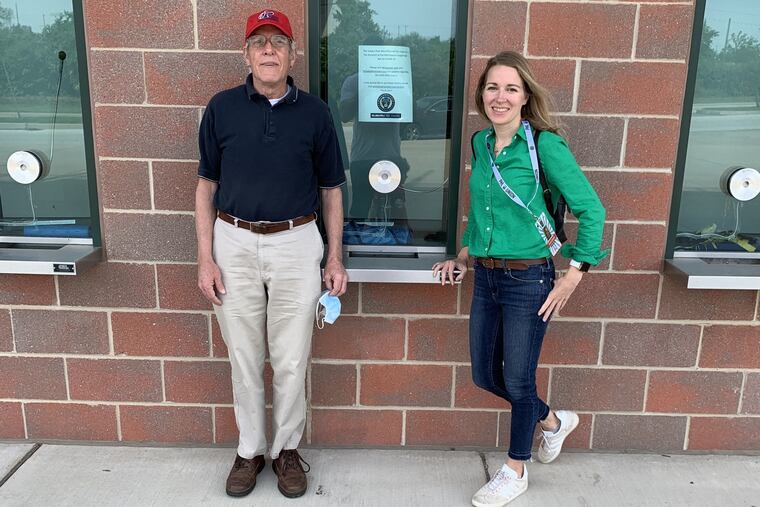Philly sports is big business, but also small business | Mike Jensen
A whole gig economy surrounds local sports, from the parking lot to the concession stands to the public-address announcers and stat crews. All on hiatus.

You walk in a front door of the Palestra needing a ticket, you probably walk up to Jack Power. This man has been selling game-day tickets for the Phillies and at the University of Pennsylvania for five decades. A glass-fronted booth in the middle of the Palestra lobby, that’s one of Jack’s homes.
“I’m third-generation," Power said of being in the ticket-selling profession in Philadelphia. “My daughter is fourth-generation. My grandfather sold tickets to the Jack Dempsey-Gene Tunney fight, 120,000 in the pouring rain in 1926.”
The history of Philadelphia sports through a particular prism. His uncle Robert worked at the Palestra when all the Big 5 games were there, and Franklin Field when the Eagles played outside. The whole family has worked the Penn Relays, a huge Philadelphia endeavor in the walk-up ticket business.
“A small labor union, very unique because most of our members are part-timers," Power said.
Right now, the work is suspended. Think about what it’s like to go to a game. If you drive, somebody takes your parking money. Power or one of his co-workers is there to sell you a ticket. (For the Phillies: “Would you like higher in the infield or lower in the outfield?” At the Palestra: “Would you like low behind the basket or high between the baskets?”)
You pass concession workers, ushers, security guards. You get to your seat at the Palestra, maybe Rich Kahn is already making announcements. The stat crew is preparing to keep count of everything that needs counting. Photographers and videographers are in place. The cleanup crew won’t show up till later.
A whole gig economy, none of it happening. Hundreds of thousands of dollars not changing hands right now because sports is on hold. Everybody thinks of sports as big business. It’s also a whole lot of small business. Say you’re making $80 a game selling tickets, multiply that by 81 home games, then multiply by the number of people doing the job.
“I’m a retiree,’’ Power said. “This is basically disposable income now. There are younger people -- not only did they lose this, but they may have lost their regular jobs. For some, this was their sole income.”
That stat crew at local sporting events -- basketball for sure, but others, too -- has been run since 1982 by Ron Pollack, and his father Harvey before him. Pollack said he has 33 people on his spreadsheet. “All except two have full-time jobs. This is used to supplement that. A few depend on the money to make ends meet.”
They got through the local college basketball season before the coronavirus stopped everything in March, and the Sixers paid full pay through the end of the regular season. But that still meant probably lost playoff income, unless the season comes back and there are playoff games in Philadelphia.
Also, there are all sorts of gigs that weren’t paid off for his guys, Pollack said. Like stats for visiting radio and television. (You can add freelance engineering jobs to that mix.)
“This time of year is usually the busiest time of year,’’ said Power, the ticket man. “If there was no corona, the Phillies would be playing, the Sixers would be in the playoffs, the Flyers would be in the playoffs. You would have just had the Penn Relays. You would have had the NCAA lacrosse championships. The Union would be playing. Then the concerts would be starting.”
Side gigs are great, but sports is Dave Cartularo’s whole gig since he graduated from Temple in 1989, and added a master’s degree there in ‘97. A friend got him into videoing high school games and then began helping shoot Temple football practice, moving that into a full-time job, while shooting high school games on the side.
He’s not at Temple anymore, but has worked freelance for Princeton and Delaware, with freelance work including a lot of Villanova women’s field sports, College of New Jersey sports, Widener lacrosse, "a bunch of high schools in the area.”
When sports shut down, Cartularo started out optimistic it wouldn’t be for long. “Hoping for a busy April and May,’’ he said then, but he quickly saw that wasn’t happening, even before official shutdowns. He called the NCAA at the end of March, asking if the NCAA was considering setting up a fund for displaced game workers. He didn’t get any response to that. As a self-employed business, a small-business owner, he’s applied for a loan and looked into unemployment. “Not planning on double-dipping,’’ Cartularo said. “I’ll take whatever comes in first.”
And if sports comes back in the fall, he’ll take that, too, since his business wouldn’t be impacted so much.
When the games return and you’re allowed back to, say, Penn, you’ll hear about it from Rich Kahn, literally.
“It’s nice supplemental income,’’ said Kahn, PA announcer for Palestra games and other Penn events, away from his full-time job. “Thankfully, I don’t need it to pay my bills, but it pays for a lot of things. I probably work three or four nights a week in season. My busiest season tends to be in the fall.”
This is supposed to be Power’s 50th season working the ticket window for the Phillies. People stay, he said, because they get treated like family. This looked to be another big walk-up year.
“Last year, everybody wanted low in right field because they wanted to see Bryce Harper,’’ Power said.
He’d assumed that would be a big request again, whenever the window reopens.